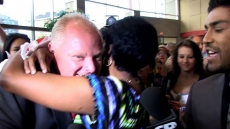WASHINGTON - Canada is "strongly opposed" to a proposal floated by the United States to post American soldiers near the border to intercept illegal migrants who could spread COVID-19, Deputy Prime Minister Chrystia Freeland said Thursday.
Freeland and Prime Minister Justin Trudeau separately confirmed a report first distributed by Global News that the U.S. has raised the idea of deploying its military within reach of the Canadian border under the pretence of protecting Americans from the novel coronavirus.
"Our understanding is a decision has not yet been acted upon or fully taken," Freeland said in her daily briefing, which went on for more than an hour and was dominated by questions about the proposal.
Countries around the world, including Canada, are responding with speed and urgency to an escalating international emergency, which means drastic measures frequently get discussed but don't necessarily come to fruition, she said.
"We understand the concerns about the coronavirus, we share those concerns very much," Freeland said.
"What we have said is, 'We really do not believe at all that there would be a public-health justification for you to take this action, of course it's up to you to decide for yourselves.' And we've said we really don't think this is the right way to treat a trusted friend and military ally."
The two countries already have a mutual ban in place on non-essential travel, but the movement of trade, commerce and cross-border workers has been allowed to continue — a clear indication that both Ottawa and the White House have embraced the economic importance of avoiding a complete shutdown at the border.
"Canada and the U.S. have the longest unmilitarized border in the world, and it is very much in both of our interests for it to remain that way," Trudeau said during his own daily appearance outside Rideau Cottage in Ottawa.
It is no secret, however, that President Donald Trump has long been seized with securing his country's southern border with Mexico, and has recently been talking about fortifying those efforts under the pretence of protecting Americans from the novel coronavirus.
On Monday, the U.S. announced a 30-day agreement with both Canada and Mexico that includes immediately returning any illegal migrants to the country from which they arrived, or to their countries of origin if that isn't possible, rather than holding them at facilities in the U.S.
Freeland said Thursday that Canada first learned about the possibility "a few days ago."
"To help prevent the introduction of COVID-19 into our border facilities and into our country, aliens subject to the order will not be held in congregate areas for processing by (Customs and Border Protection) and instead will immediately be turned away from ports of entry," the Department of Homeland Security said in a statement earlier this week.
"Those encountered between ports of entry after illegally crossing the border similarly will not be held in congregate areas for processing and instead, to the maximum extent feasible, will immediately be returned to their country of last transit."
As part of that trilateral agreement, Canada has also agreed to send so-called "irregular" migrants who cross the border somewhere other than at an official port of entry back to the U.S.
Canada has since also imposed a mandatory quarantine on anyone entering the country, regardless of whether or not they have symptoms of COVID-19; with the promise of steep fines or even jail time for violators.
Freeland confirmed that Canada's Ambassador Kirsten Hillman, who only on Thursday was formally elevated to the full-time role after having been acting envoy to the U.S. since the summer, has been directly involved in the discussions about the proposal.
"Last week, (Canada and the U.S.) managed — working collaboratively together — a very good reciprocal and co-operative agreement on restricting non-essential travel across our shared border," Freeland said.
"In view of all of these connections and the importance of the relationship, Canada is strongly opposed to this U.S. proposal and we have made that opposition very, very clear to our American counterparts, and we will continue to do so."


